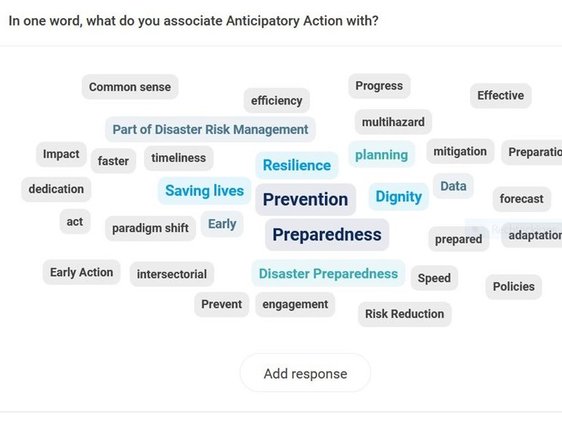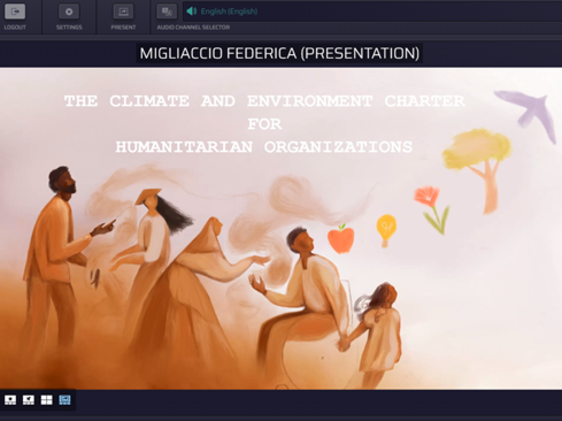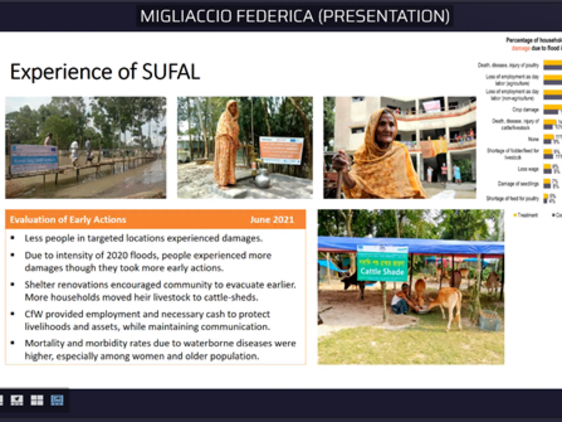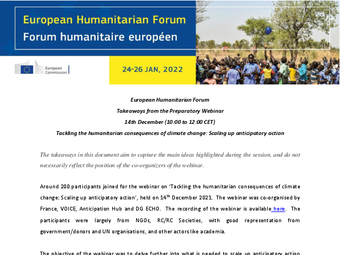Categories
Tackling the humanitarian consequences of climate change: scaling up anticipatory action
On 14 December 2021, the Anticipation Hub, together with DG ECHO, France and VOICE, co-organized a webinar on ‘Tackling the humanitarian consequences of climate change: scaling up anticipatory action’. The objective of the webinar was to take stock of and delve further into what is needed to scale up anticipatory action.
This webinar was part of preparations for the European Humanitarian Forum, which was planned to take place from 24-26 January 2022 but has now been postponed until 21-23 March (see here for more details). This pre-forum webinar is available to watch here.
Around 200 participants joined the event, representing NGOs, the Red Cross and Red Crescent Movement, governments, donors, UN agencies and academia. They heard from a number of different speakers, including opening remarks from representatives of the ICRC and IFRC, the French government, VOICE and OCHA. Following this, compelling regional case studies of anticipatory action were presented by the Kenya Red Cross, the National Disaster Risk Management Commission in Ethiopia, the IGAD Climate Prediction and Applications Centre, the ASEAN Secretariat, CARE Bangladesh and Concern Worldwide Bangladesh.

200 participants share what word they associate anticipatory action with.

IFRC and ICRC representative present the Climate and Environment Charter for Humanitarian Organisations.

Sumaiya Kabir from CARE Bangladesh presents lessons from the SUFAL project.

200 participants share what word they associate anticipatory action with.
IFRC and ICRC representative present the Climate and Environment Charter for Humanitarian Organisations.
Sumaiya Kabir from CARE Bangladesh presents lessons from the SUFAL project.
During the following roundtable discussion, participants shared their vision for anticipatory action in 2030, reaffirming the insights shared by earlier speakers and emphasizing the importance of government leadership, local collaboration, and collective learning to scale-up anticipatory action successfully. Speakers here included representatives from WFP, the Anticipatory Action Task Force, the French Red Cross, WMO, the Joint Research Centre, the National Disaster Risk Reduction and Management Authority Nepal (NDRRMA), UNDRR, the German Federal Foreign Office, the InsuResilience Global Partnership, the Global Facility for Disaster Risk Reduction and ICRC.
A major challenge lies in exchanging knowledge on anticipatory action approaches to understand what works and what does not. A key lesson learnt in Nepal is the need for these actions to be informed by multi-hazard risk assessments and impact-based forecasting.
Our donors understood the importance of having these things [impact based forecasting linked to early action] in place so they stretched a little bit the area of the location of their funding and advocacted for other donors to join.
Donors can be a major catalyst to ensure anticipatory actions are not developing in isolation, and that messaging to national governments is unified and clear. A coordinated approach to anticipatory action is essential.
Investment in anticipatory action needs more than the ‘fuel money’ - we need to invest in building local capacity for anticipatory action and to mainstream anticipatory action throughout our organizations.
Some key takeaways from the event outline what needs to happen to scale up anticipatory action as one of the means to address climate impacts. These include:
- strengthen evidence base and promote knowledge exchange to improve and expand anticipatory action
- maximize the use of risk analysis and foresight to enable anticipatory action at the national level with impact-based forecasting
- mainstream anticipatory action at country and regional levels across disaster risk management and climate change adaptation frameworks
- enable flexible and predictable financing for anticipatory action, and integrate this across the climate-humanitarian-development nexus
- expand anticipatory action to fragile and conflict-affected areas.
These messages are presented in an outcome document that will feed into high-level dialogues at the European Humanitarian Forum.

